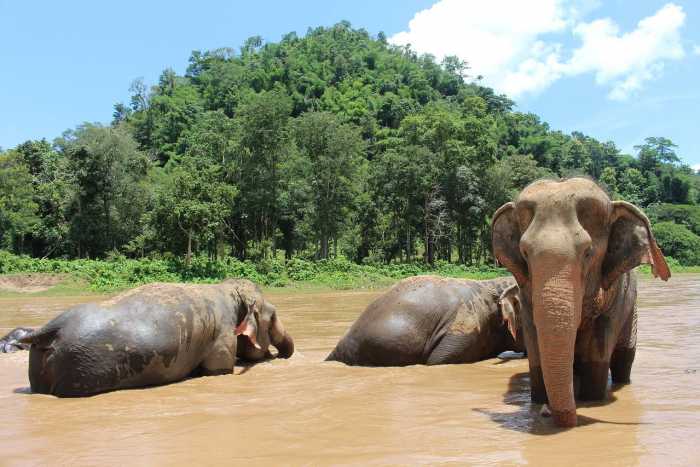
Ethical Travel in Thailand

The tourism industry can be tremendously beneficial to the local economy as well as people living there. But if it goes unchecked, it can damage the local environmental system, disrespect local communities, encourage brutality with animals and lead to more unethical practices.
Fortunately, the movement for ethical travel is pushing the travel industry to make responsible choices that are wholly beneficial. Ethical travel is even more critical in countries like Thailand.
Thailand tourism industry is thriving, with more than 30 million visitors every year. There have been already many stories of how tourism is straining local resources and degrading the environment. From the brutal side of animal tourism to jeopardizing the marine ecosystem, many stories creating a complicated situation.
So, let’s be a responsible traveller and learn the activities you might do, without adversely impacting Thailand’s resources.
Not Riding Elephants
In many parts of the world, including Southeast Asia, elephants have been one of the primary means of transportation for centuries. However, in 1989, the Thai government banned using elephants for logging to protect wildlife.
Elephant tours may look great at first. But riding elephants strain their spine, and eventually, damages them permanently. Also, newborn elephants have been prodded into submission to convince them to allow riders on their backs, which crushes their natural, wild spirit.
So being a responsible traveller, you are encouraged to avoid the elephant riding in Thailand.
But having fun with Thailand’s national animal is a must. For this, you can visit elephant retirement parks, where you can feed the animal, pamper them and click lots of pictures with them.
Some must-visit elephant sanctuaries in Thailand are Elephant Nature Park near Chiang Mai, Boon Lott’s Elephant Sanctuary, Elephant Haven, and Burm and Emily’s Elephant Sanctuary.
Spend Your Money Locally
If you stay at international hotels, eat at foreign-owned outlets, and buy imported goods in Thailand, all the money is sent out of the country. Also, there’s no point in shopping and eating something that you can shop or eat anywhere in the world.
Instead, spend your money with local businesses so that the cash remains in the same country you’re exploring. It benefits the country’s economy as well as people who live there.
In Thailand, there are plenty of local hotels, restaurants, shopping centeres where you can get a much more exciting experience.
Be Responsible During a Hill Tribe Trek
Hill tribe trekking in Northern Thailand is often exciting for cultural travellers. But in recent years, there’ve been many issues about visiting the hill tribe people of Thailand.
There has been growing evidence that tour operators exploit tribal people. Many describe tribal villages “human zoos” where people are trapped to their communities, compelled to wear traditional garb and receive only a small fraction of the profits from the tours.
But that does mean you can’t have the enriching and responsible experiences visiting tribal villages in Thailand.
You should reach out to companies that arrange ethical trips to authentic villages, share their revenues with the community, and employ local guides from the hill tribes. There are dozens of such companies. Do your research before choosing one.
Avoid Tiger Tourism
A selfie with tigers certainly sounds an exciting idea. But if you are planning ethical travel to Thailand, make sure you avoid tiger tourism. This is because like the elephants used in tourism, newborn tigers are often separated from their mothers and then chained, starved, beaten and confined in cages.
Though the Thailand government shut down the notorious Tiger Temple in Kanchanaburi, similar venues are still operating across the nation. They host circus performances and allow visitors to pet or hug a tiger.
The ethical way to see animals in Thailand, you can visit the country’s national parks, where you can see wild animals roaming free and click as many photos as you want.
Also, avoid visiting the Chatuchak Weekend Market and similar venues where lots of living animals are unethically sold.
Be Careful Underwater
Scuba diving or snorkelling are on every Thailand itinerary as you can explore the island’s magnificent marine life, like tropical fish and coral reefs.
But it is essential to understand that the ocean’s eco-systems are fragile. Unethical interaction with sea creatures can make them sick and even cause their death.
Avoid diving with companies that feed these fishes and coral, or encourage divers to touch them. Practice your diving skills to avoid brushing against fish or coral you swim by.
Careful Volunteering
Travellers have an abundance of volunteering opportunities in Thailand. While volunteering has good intentions, unfortunately, it often does more harm than good.
Voluntourists often lack required skills for the purpose they’re sent to do, like teaching, cleanliness, agriculture, etc. Moreover, most of these are short-term volunteers who fail to make a meaningful impact on the community they are serving. Though they’re not hurting anyone, these programs waste the local community’s resources and time.
So unless you have a useful skill and you can commit to a long-term volunteering, consider donating to an NGO for a much more positive impact than volunteering.
Bonus Tip
What you pack on your Thailand trip also makes a difference. Avoid plastic bags and water bottles; instead, use refillable water bottles and reusable cloth bags.
Of course, there’s still more to ethical travel in Thailand, these are essential steps in the right direction, and an excellent place to start, if you are new to responsible tourism.







